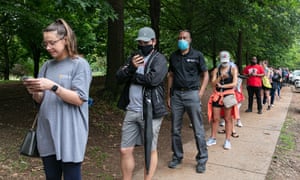Georgia’s bungled primary election added to cocktail of frustrations held by voters amid pandemic and protests against police brutality

Photograph: MohammadJavad Jahangir/Rex/Shutterstock
Simone Alisa arrived at her polling place in Atlanta’s Old Fourth Ward at 9.45am on Tuesday. Five hours later, she would cast her vote.
Georgia’s primary election, which the Atlanta Journal-Constitution called a “complete meltdown” due to the long lines, faulty voting machines and understaffed polling stations, left much of the state stupefied. For Alisa, a 66-year-old interior designer, it was a wake-up call.
On Tuesday, as the minutes of waiting turned into hours, the line she waited in took shape. Volunteers handed out bottles of water, burritos and Chick-fil-A sandwiches to visibly grateful and perspiring voters. Others came prepared, bringing with them umbrellas, lawn chairs and in some cases, laptops on which to work as the line crawled forward.
For her part, Alisa arrived with a camouflage face mask and a handwritten list of candidates she was voting for, among them Fani Willis for county district attorney and the Democratic presidential candidate Joe Biden. She expected a 30-minute wait, she said, like all the other times she had voted there. As the line inched forward, Alisa befriended a group of voters behind her, all millennials. “These are my people,” she said with a laugh, adding that they had held her place in line when she left for much-needed breaks.
“What we had [yesterday] was just ridiculous,” Alisa said in a phone interview on Wednesday. The bungled election, she said, added to a cocktail of frustrations experienced by voters, due to the coronavirus pandemic and the protests against police brutality and racism that have taken hold across America after the killing of George Floyd.
Born in Ohio to immigrant parents from Panama and Jamaica, Alisa had moved to the southern metropolis 30 years ago. “Atlanta was like the ‘black Mecca’,” she said. “I felt there were better opportunities for me.”
Those promises rang true for Alisa. But others in her city are struggling and a new president alone won’t change that. A lifelong Democrat, Alisa paused when asked about the appeal of Democratic presidential candidate Joe Biden. She was more interested in who he would pick as a running mate. She’s hoping to see the former Georgia state minority leader Stacey Abrams on the ticket, she said, in large part due to Abrams’ work around the issue of voter suppression.
“With what happened yesterday and how we were all standing and waiting, yeah, [who he chooses] is going to be critical for him,” she said.
When she finally made it inside the recreation center that day it was close to 3pm. Alisa saw just 10 voter booths and poll workers. “It’s going slow,” she said after casting her vote. “Something’s wrong with this picture.”
That night, Alisa’s polling place would stay open until 9pm to account for the lag. Other voters would still be in line at midnight. Voting rights and civil liberty groups said the election was a “massive failure”. “Countless Georgians were deprived of their sacred right to vote,” said Andrea Young, executive director of the ACLU of Georgia.
Georgia’s secretary of state’s office, which instituted the new voting machines, and the state legislature’s top-ranking Republican announced separate investigations into the primary election. The inquiries will look into, in particular, what happened in Fulton county, where Alisa voted.
For Alisa, the experience reinforced her belief in voting as a vehicle for change. She has gone to the same polling station for the last decade, she said. Never has she experienced anything like yesterday. “As far as voting goes, I think people have gotten away from human decency. If you have [that], you will do what is right,” she said.
She now plans to volunteer as a poll worker in November.




